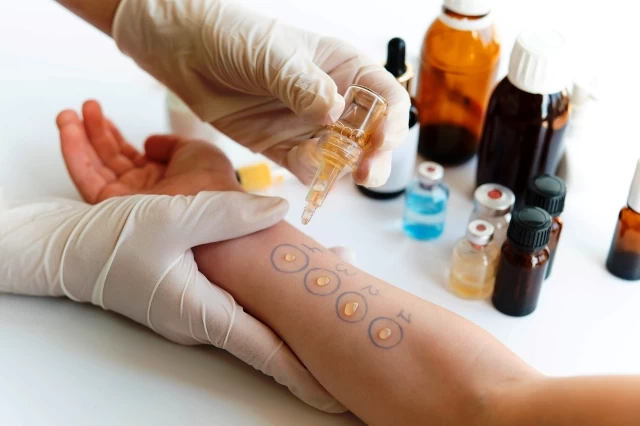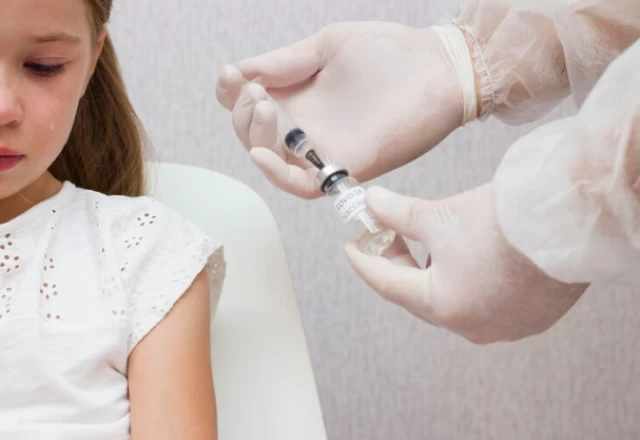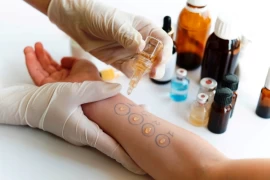
Allergy Skin Prick Test
- Allergy Skin Prick Test
- How is the Allergy Skin Prick Test Performed?
- How Long Does it Take for the Allergy Skin Prick Test Results?
- Are Allergy Skin Prick Test Results 100% Reliable?
- Can Allergy Skin Prick Tests be Conducted at Any Age?
- Which Foods can be Evaluated with Allergy Skin Prick Tests?
- Which Allergens can be Evaluated with Skin Tests for Respiratory Allergies?
- Can Allergic Diseases be Treated Without Allergy Testing?
- What Precautions should be taken before Allergy Skin Testing?
- Why is the Allergy Skin Prick Test Important?
- Are There Risks Associated with the Allergy Skin Prick Test?
- Who Should Not Undergo Allergy Skin Prick Testing?
How is the Allergy Skin Prick Test Performed?
Allergy skin prick tests are conducted based on the principle of introducing allergens that could be responsible for an allergic reaction into the skin. It is a non-invasive procedure and does not involve bleeding or incisions. In small children, the back area is preferred due to limited space and increased mobility, while in older children, the inner surface of the arm is more commonly used.
How Long Does it Take for the Allergy Skin Prick Test Results?
Results are typically available approximately 15-20 minutes after the procedure and are evaluated by a physician.
Are Allergy Skin Prick Test Results 100% Reliable?
Allergy tests always require interpretation. Therefore, it's essential not just to consider the numerical values on paper but to evaluate the results in conjunction with clinical findings. The compatibility between the test and the clinical presentation plays a crucial role in both prevention and treatment, and the reliability is quite high. It's important to remember that not all allergic diseases occur through IgE (Immunoglobulin E) mediation.
Skin tests do not guide treatment for non-IgE mediated allergies because they only provide information for IgE-mediated allergies. Therefore, it is advisable to perform them under physician guidance.
Can Allergy Skin Prick Tests be Conducted at Any Age?
Skin tests for food allergies can be performed from the newborn period onwards. Waiting until the age of one or two may unfortunately lead to delays in diagnosis and treatment, and may result in incorrect and/or unnecessary diets. This information is particularly valuable due to the higher frequency of food allergies in the first two years of life. Skin tests for evaluating respiratory allergies are typically recommended after the age of two.
Which Foods can be Evaluated with Allergy Skin Prick Tests?
Using commercially prepared ready-to-use drops in skin prick tests, many foods can be evaluated. Examples include milk, eggs, various nuts, red and white meat, wheat, sesame, lentils, rice, rye, oats, cocoa, tomatoes, and potatoes. Skin prick tests (prick to prick) can also be performed for almost any food using the food itself. This is particularly valuable for differentiating between allergies to different types of fish. Since each fish allergy is species-specific, separate skin tests can be prepared and evaluated for the most commonly consumed fish species in a family.

Which Allergens can be Evaluated with Skin Tests for Respiratory Allergies?
Skin tests can be used to evaluate many respiratory allergens such as house dust mites, pets (cats, dogs, birds, horse hair), various mold species, tree, grass, and weed pollens, and cockroach allergens.
Can Allergic Diseases be Treated Without Allergy Testing?
One of the common mistakes is delaying a visit to an allergy specialist because "we can't stop medication for a long time, and testing cannot be done." The most valuable information for treating allergic diseases is always obtained through your medical history (anamnesis) and examination. Even if testing is not suitable on the day of the visit, the treatment plan is made without delay, and an appointment is scheduled for testing. Treatment is never delayed just because testing cannot be performed. This applies to both food and respiratory allergies.
What Precautions should be taken before Allergy Skin Testing?
Certain medications that could interfere with the evaluation of allergy tests should be avoided for a specific period before the test. Particularly, medications containing antihistamines, which suppress allergic responses, should not be used for a certain period before the test. Informing your physician about the medications you are using and refraining from using them for the duration recommended by your physician is important for the reliability of the test.
Why is the Allergy Skin Prick Test Important?
For IgE-mediated food allergies, the skin prick test is invaluable in creating a proper dietary plan, monitoring recovery, and determining when to reintroduce foods. For respiratory allergies, it is essential in implementing appropriate environmental measures and determining which allergens to include in allergy immunotherapy (vaccine) for eligible patients.
Are There Risks Associated with the Allergy Skin Prick Test?
Although rare, because the substance applied to the skin is an allergen, skin tests can cause allergic reactions. Therefore, they should always be performed under the supervision of a physician.
Who Should Not Undergo Allergy Skin Prick Testing?
- Skin tests may not be preferred for patients who cannot discontinue anti-histamine treatment since the test results may not be reliable in these patients.
- In cases where there are intense eczema-like rashes in the area where the test will be performed, technically, it may not be appropriate to perform the skin test.
- Skin testing may not be preferred for patients using medications that may affect test responses in the treatment of certain chronic diseases.
- In patients at high risk of severe anaphylaxis, blood allergy testing may be preferred over skin testing to avoid exposure to allergens.

Assoc. Prof. Dr. Mehtap Kılıç
Pediatric Allergy and Immunology Specialist





